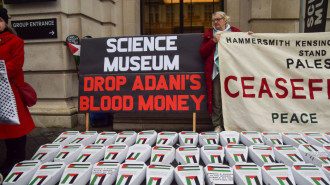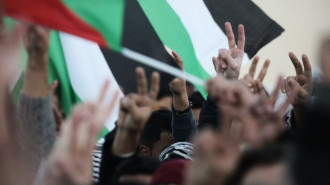
'We hoped the next generation could live as humans': One year of Taliban rule, Afghan women have left or are in hiding

Basira Paigham remembers the night before Kabul, the capital city of Afghanistan, fell to the Taliban.
“I couldn’t see the light,” Paigham, a 24-year-old gender equality activist, said. “I couldn’t think, I couldn’t decide what to do. Time stopped and everywhere was dark. People were running. Everyone was afraid, hopeless, sad and angry.”
Basira had bought food at the supermarket, so she could “stay alive” in her apartment if the Taliban captured the city.
She never got the chance to cook her groceries. Within days of the Taliban claiming power in Afghanistan, Basira claims she started receiving threatening calls on her phone because of her activism in support of women and the LGBTQI community.
"According to the International Labor Organization, the participation of Afghan women in the professional sector has dropped from 22% to a staggering 16%"
“I was getting calls from unknown numbers, and my apartment was searched by the Taliban,” Basira, who shifted to a hotel in fear of her safety, alleges. “They knew my address, and my friends rejected to help me stay in their homes because they were afraid as well.”
She obtained a visa to cross the border to Pakistan in late October 2021 and fled to Ireland, where she lives today. “I didn’t have any dream, any plan outside of Afghanistan. It was like dying again and being reborn,” she said of leaving her homeland.
A year has passed since the Taliban seized political governance in Afghanistan in the wake of the United States military withdrawal, bringing an end to a two-decade-long occupation that they say was aimed at bringing democracy and eliminating terrorism in the Muslim-majority country.
“Everybody was in shock,” Farzana Ehsas, a 24-year-old journalist and former worker in a development organisation recalled. On the night of August 14, Farzana scrolled through her phone in disbelief, watching “pictures and videos” of members of the Taliban entering the city. Three hours later, she switched on the television to discover that the then-president Ashraf Ghani had fled the country.
"We were hoping that if we are the victims today, then at least the next generation can live as humans"
Since then, Afghan women and girls’ involvement in school and the workplace has significantly ebbed. Minorities like the Shia Muslim Hazara face an increased threat of violence, and Afghans mourn the loss of social progress following the Taliban’s return to power.
“There wasn’t security in Afghanistan before the Taliban,” Farzana, who now lives in Paris, said. “But we were hoping that if we are the victims [today], then at least the next generation can live as humans. Unfortunately, after the collapse, everything changed.”
Women disappearing from the workplace
The Taliban banned girls from attending secondary school, and women’s participation in the workforce has declined with the government’s ordinance that they stay at home.
Women also face daily forms of state-enforced discrimination that throw their safety at risk, such as the Taliban’s decree they wear the veil in public, which mandates covering the face.
"Women’s involvement in every sector of Afghan society was getting stronger by the day [before the takeover]; they had infiltrated governance, technology, business, and education. They were leaders. And that is gone. They have all left Afghanistan, and if they haven’t, they are in hiding"
“We have seen instances of men and women, husband and wife, holding hands and then being physically assaulted or detained,” Sara Wahedi, a 27-year-old student at Columbia University and founder of Ehtesab, a live crisis alert app, said.
“We have seen stories of women wearing Western clothing, who have been detained or assaulted. Women are mitigating that by wearing the burqa, or by wearing a very traditional, religious version of the hijab and also wearing masks.”
According to the International Labor Organization, the participation of Afghan women in the professional sector has dropped from 22 percent to a staggering 16 percent, and Human Rights Watch reports that women who are breadwinners for their families are being prevented from going to work by the government, throwing their livelihood and the survival of people who depend on them in jeopardy.
“Half of the population has disappeared from Afghan society,” Sara said.
“Women’s involvement in every sector of Afghan society was getting stronger by the day [before the takeover]; they had infiltrated governance, technology, business, and education. They were leaders. And that is gone. They have all left Afghanistan, and if they haven’t, they are in hiding.”
According to Nergis Nehan, a former Afghan politician and founder of a non-profit peace advocacy organisation, 27 percent of civil servants in the Ghani-led government were women, a stark contrast to the Taliban’s recent edict that women in the finance ministry send a male relative to work on their behalf.
"Afghan women protesting against the Taliban are braver than US or NATO soldiers"
The Taliban has also slashed female civil servants’ salaries, banned women in most ministries from going to work, and excluded women in recruitment for hiring government workers.
Women who continue to physically go to work risk their safety, a problem that Sara confronted as the CEO of her startup when she realised her female employees could be detained for helping keep her small venture running.
“I could not put anyone in danger or actively try to find women within my team,” she explained. “It was irresponsible. After the takeover on August 15, it was imperative to get the female staff out of the country as soon as possible. With men on my team, they can mesh within the Talib environment, [but] if we have women on our team, they could be a target.”
Companies like Sara’s are unable to guarantee the well-being and safety of women who work for them, which has led to reduced hiring of women in the private sector out of fear of the Taliban’s crackdown and censure.
“They prefer to hire a man instead of a woman, so they don’t face any problems with the Taliban,” Farzana explained. “Before, there was a chance for women [in the workplace], but now there’s more of a chance for men.”
The loss of rights of the Hazara minority
When Freshta Tori Jan was in school, children would slap her and deride her dark, slanted eyes. “They’d make fun of me and be like, ‘Ching Chang Chong, go back to China',” Freshta, a 22-year-old student and small business owner who now lives in Michigan, said.
"I have no control over how I have Asiatic eyes, or that I was born with specific physical features. The Pashtuns and the Tajiks think that having those physical features means that you’re biologically inferior to them"
Freshta is part of the Hazara ethnic minority, who practice Shia Islam and are visibly different from the Pashtun and Tajik ethnic groups, which hold the most social power in Afghanistan.
“I was so tired of being discriminated against and persecuted for literally the way I look. I have no control over how I have Asiatic eyes, or that I was born with specific physical features. The Pashtuns and the Tajiks think that having those physical features means that you’re biologically inferior to them.”
For centuries, the Hazaras have faced racism and ethnic cleansing. In the late 1800s, Abdur Rahman Khan, the king of Afghanistan, tried to conquer Hazarajat, the Hazaras’ historical homeland, incurring uprisings which Khan repressed with mass killings and enslavement.
Approximately 60 percent of the population was killed or displaced from their native region.
|
Today, Hazaras face inequality in all dimensions of Afghan society, ranging from microaggressions in the school and workplace, racial profiling by the police, institutionalised exclusion and discrimination, and the continuation of bombings, target killings, and violent massacres targeting Hazara-majority neighbourhoods, villages, and areas.
Farzana, who belongs to the minority group, worked for a non-governmental aid organisation associated with Sweden, before fleeing Afghanistan.
“There were 300 people working in the main office. But there were three Hazaras,” Farzana said. “It was funny for me. Three Hazaras among 300 people. Then I was the fourth one. When I joined, I was active, because I was young, I was energetic, and I was trying to work a lot and make progress. But I heard several times that people are calling me ‘Hazaragak’, not in front of me, but behind my back.”
Racial discrimination against Hazaras is thus normalised in Afghanistan, with many feeling that it appears even in progressive or peace-building organisations.
The Taliban’s imposition of a rigid form of Sunni Islam further marginalises the minority group, and the militant group’s rise to power in 2021 was marked with violence specifically targeting Hazaras.
“As a Hazara, you know every day they’re killing people,” Farzana, who has family back in Afghanistan, said. “Right now, they’re threatening people every day, and asking for money. My father was threatened by the Taliban, even before they took over, and on the way from Ghazni to Kabul, they arrested my cousin.”
"There are so many Hazara towns that were burned down. The Taliban came into the town. They shot the men, raped the women, and took the boys"
Numerous attacks periodically occur targeting the Hazara-majority areas from militant outfits. In the first week of August, a series of attacks left 120 people dead. Freshta said she had to “shut down” her Signal and WhatsApp in the days after the takeover because of explicit videos she received of violence against her community.
“There are so many Hazara towns that were burned down. The Taliban came into the town. They shot the men, raped the women, and took the boys,” she claims.
|
Standing up to the Taliban
In a rare instance of protest, about 40 women marched near the education ministry in Kabul demanding the right to work on Monday. While the march was violently dispersed by Taliban fighters, the act of civil disobedience signalled Afghan citizens’ pointed refusal to accept the Taliban’s violent constraints on women’s rights.
“Afghan women protesting against the Taliban are braver than US or NATO soldiers,” Basira, the gender equality activist, said. “The troops with developed and powerful weapons left us to the Taliban, but Afghan women are standing for freedom and equality against the cruel regime.”
Hope appears in the flickers of resistance against the Taliban, not only among women but young people as well, who have grown up in war and desire a different future for their country.
“The hope I have for a liberated Afghanistan is because of this generation,” Shamayel Shalizi, a 30-year-old artist originally from Kabul, who lives in Berlin, said. “They’re politically astute, they know what’s going on. They were raised in a time where we were working towards a post-war Afghanistan, and when you’ve grown up in war, you just want the simple pleasures of life.”
As a young child, Freshta Tori Jan remembers hiding in her basement with her family in the Herat province when the Taliban attacked her hometown in the early 2000s. She used to think the “bullets and rockets” were stars.
“Those were events that were just becoming so normal throughout my life,” Freshta said. “We had generations that had been born into war who were starting to learn history and what stability looks like, and the progress we had made in different ways. And all that opportunity, within a week, just completely disappeared.”
Iman Sultan is a writer and journalist on politics and culture. She grew up in Philadelphia and now resides in Karachi, Pakistan.
Follow her on Twitter: @karachiiite
![Afghan women hold placards as they march and shout slogans "Bread, work, freedom" during a womens' rights protest in Kabul on August 13, 2022 [Getty Images]](/sites/default/files/styles/medium_16_9/public/2022-08/GettyImages-1242470909.jpg?h=21017897&itok=P3_kBVtR)
![This combination of photos shows women posing for portraits in different cities in Afghanistan [Getty Images]](/sites/default/files/styles/medium_16_9/public/2022-08/GettyImages-1242394853.jpg?h=c1032d48&itok=9umFXDng)


